The dark web is a hidden part of the web that is not indexed by traditional search engines like Google and requires specialized software to access.
It is a subset of the deep web that holds private content, like emails or databases, hidden behind passwords and not indexed by search engines. In contrast, the surface web includes public websites that are easily found using search engines.
The dark web often connotes illicit activities like illegal drug sales and hacking. However, it also supports legitimate uses like protecting free speech and accessing information in censored regions.
In this article, we will unpack everything you should know about what the dark web is, how it works, how to surf it safely, and more. Let’s dive in.
What Is the Dark Web?
The web, you know, has three layers: the surface web, the deep web, and the dark web.
The surface web is the open part of the internet, which includes publicly accessible websites and resources. Search engines index all the web resources on the surface web, so you can search for them online. You just need standard browsers like Chrome, Edge, and Safari to open websites on the surface web.
For example, your Geekflare.com—your trusted business resource for growth exists on the surface web. To reach Geekflare.com, you can either type its URL in your standard web browser or search for Geekflare in your favorite search engine.
Wikipedia, YouTube, Amazon’s eCommerce store, blogs, and websites that are freely accessible without entering passwords are examples of the surface web.
On the other hand, the deep web is the hidden part of the Internet that contains private or restricted content that is not indexed by search engines. Unlike the surface web, you can’t access deep web resources directly through a search engine; they require login credentials or special permissions.
For instance, your email inbox, online banking account, or a company’s internal database resides in the deep web. To access these resources, you need to log in with a username and password using a traditional browser like Chrome or Safari.
The dark web, a subset of the deep web, cannot be accessed with a regular browser. You need a specialized browser like Tor to access its websites. It hosts encrypted websites, often used for privacy, anonymity, or illicit activities.
How the Dark Web Works?
Tor, I2P, and Freenet are three common technologies that make up the dark web. Each technology offers different features. Let’s explore them.
Freenet
Freenet is a decentralized, peer-to-peer platform designed for the secure and anonymous sharing of information over the Internet. It focuses on privacy, censorship resistance, and ensuring free access to content. To access the Freenet-based dark web, you need to install the Freenet application.
I2P
I2P, or the Invisible Internet Project, is an anonymous network layer to facilitate secure and private communication among its users. It works as a decentralized, peer-to-peer network that emphasizes censorship resistance and complete anonymity.
Like Freenet, I2P has its own dark web that consists of websites ending in b32.i2p. You need an anonymous I2P client to access I2P websites.
Tor
Tor, short for The Onion Router, is a privacy-focused network that allows you to browse the Internet anonymously. It works by routing your encrypted traffic through multiple volunteer-operated servers, known as onion routers. Tor is by far the most widely used dark web network and is the biggest network in terms of content and activities.
Tor was developed in the mid-1990s by the U.S. Naval Research Laboratory to enable secure and anonymous communication. Later released as open-source, it became widely accessible for privacy-focused use. However, due to the prevalence of criminal activities on the Tor dark web, it is now often associated with illegal activities.
In this article, we will explore the Tor dark web, referring to it simply as the dark web.
Why the Dark Web Exists
The dark web exists to provide users with anonymity and privacy on the internet. Some users, such as whistleblowers or journalists working on sensitive issues in oppressive authoritarian governments, need privacy to carry out their activities. The dark web perfectly fulfills this objective.
The dark web also offers access to blocked resources in countries with strict government censorship on the internet. Citizens of such countries can use the dark web to bypass firewalls and access global information.
However, anonymity and privacy of the dark web also contribute to various crimes, such as black markets for illegal drugs and materials, human trafficking, the trade of stolen sensitive data, and access to extreme content.
Hackers sell stolen data on the dark web. You can use these dark web investigation tools to check if your company’s data is available on the dark web.
Risks and Dangers of the Dark Web
Visiting the dark web, if you don’t exercise caution and have enough security, poses many security and legal risks that can lead to data theft, identity fraud, and legal consequences.
The following are key risks of accessing the dark web you should be aware of.
Cybersecurity Threats
As dark web websites are not moderated, they can host a wide range of malware, such as ransomware, keylogger, and remote access Trojan. You can inadvertently download malicious software by visiting these websites, infecting your system.
Knowing about various types of ransomware and common hacks can help you better prepare to spot cybersecurity threats on the dark web.
Exposure to Illegal Content
The dark web hosts various types of illegal content, such as stolen data, child exploitation material, and prohibited items. As an average Internet user, you may accidentally stumble upon such content. Your access to illegal content, even if it is unintentional, can violate laws in many countries. Consequently, you may face serious legal consequences.
Scams and Fraud
You might visit the dark web seeking anonymity or unique services, but this anonymity also attracts scammers. You may encounter fake marketplaces promising illicit goods or services but delivering nothing after payment.
Cryptocurrency is the primary payment method, making transactions irreversible and nearly impossible to trace. This leaves victims with no recourse if they fall for a scam.
Phishing schemes and fake escrow services are also common. These tactics trick users into revealing sensitive information or paying for non-existent products.
Law Enforcement Monitoring
Law enforcement agencies in many countries monitor the dark web to combat illegal activities. Cracking down on many illegal marketplaces on the dark web is the result of such monitoring. So, you risk being flagged or investigated for visiting certain sites, even without criminal intent.
Ethical Concerns
Though the dark web offers anonymity for journalists and activists in oppressive regimes, it raises many ethical concerns.
When you visit dark web sites, even if you don’t have any ill intentions, you support the dark web ecosystem, which serves as a medium to conduct various illegal activities.
The dark web marketplaces thrive on the demand for illegal services and extreme content. Your accidental visit to such sites can contribute to the perception of the demand, encouraging criminals to continue or expand their operations.
Also, viewing extreme content available on the dark web can desensitize users to wrongdoing.
That said, you should avoid visiting the dark web. When you must visit the dark web, you should exercise extreme caution and avoid accessing illegal marketplaces or engaging with disturbing or extreme content.
Is It Illegal To Go on the Dark Web?
Accessing the Dark Web, a part of the web that isn’t indexed by standard search engines, is not illegal in most countries. People use it for various legitimate reasons, such as bypassing censorship in restrictive countries.
However, while visiting the dark web itself isn’t against the law, engaging in illegal activities there is. The dark web contains a range of content, some of which is illegal, including marketplaces for drugs, weapons, stolen data, and other illicit services.
If you engage in illegal activities or access illegal content that could implicate you in a criminal offense, you may face serious legal consequences, including fines and imprisonment.
Myths vs. Reality of the Dark Web
The dark web is often shrouded in mystery, contributing to several misconceptions about its purpose and functionality. Below, we have busted common dark web myths to help you separate fact from fiction.
Myth 1: The Dark Web Is Only Used for Illegal Activities.
The dark web is not exclusively used for illegal activities. Many people use it for privacy-focused communication, whistleblowing, or accessing restricted information in censorship-heavy regions. Platforms like SecureDrop even allow journalists to receive tips anonymously.
Myth 2: Only Criminals Access the Dark Web.
The myth that only criminals use the dark web is false. Many people access it for legitimate reasons. Journalists, activists, and individuals in restrictive countries use it for privacy and free speech.
Myth 3: The Dark Web and Deep Web Are the Same.
No, the deep web and the dark web are not the same. The Deep Web includes unindexed content like private databases and password-protected sites accessible with standard browsers.
The dark web is a small part of the deep web that requires special software and is often associated with anonymity and illicit activities.
Read dark web vs. deep web to get more context.
Myth 4: The Dark Web Is Inherently Dangerous To Visit.
If you take proper precautions, visiting the Dark Web isn’t inherently dangerous. Though the dark web hosts illegal activities and malicious sites, it also serves legitimate purposes like secure communication for activists and journalists.
Malware, scams, and illegal content pose security risks. However, with the right security measures and cautious browsing, you can minimize these dangers.
Myth 5: All Content on the Dark Web Is Easily Accessible
Not all dark web content is easily accessible. While Tor lets you reach .onion sites, many require invitations, passwords, or verification. Also, URLs often change to evade detection. Slow speed and prevalent scams also make navigation tough.
Myth 6: More Than 90 – 96% of the Internet Is Made Up of the Dark Web.
Contrary to a widespread misconception, the dark web is a tiny part of the web. According to Recorded Future research[1], out of 55,000 onion domains discovered, only 8,400 have a live site.
9 Tips for Staying Safe on the Dark Web
The dark web is a playground for hackers, cybercriminals, and people with nefarious objectives. We strongly advise you against visiting it, even if your intentions are good.
The dark web poses severe risks to your security. You will never know when you stumble upon illegal materials, inadvertently download malicious software, or expose yourself to identity theft. But if you must visit the dark web for ethical reasons, here are some safety precautions.
1. Rely on Secure Browsers (e.g., Tor)
The Tor darknet websites have .onion addresses. Though there are other ways to access onion websites, it is recommended that you always use Tor to access dark web websites. It offers better speed and security than other alternative methods.
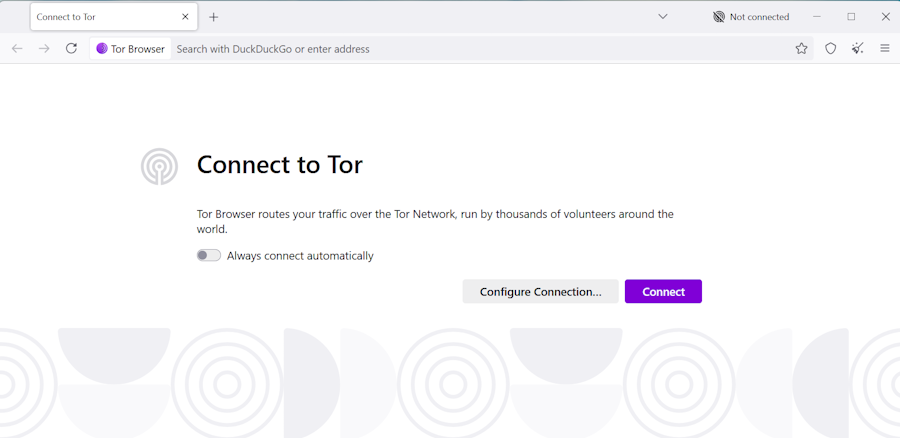
Visit the Tor project’s website to download Tor. It is available for various devices, including Windows, Linux, Android, and MacOS.
2. Use a Trusted VPN
While Tor offers anonymity by routing your traffic through a decentralized network of nodes (onion routing), it shouldn’t be your only line of defense for privacy. Malicious actors and government agencies can run Tor nodes, compromising privacy and security. In fact, there have been instances where attackers controlled hundreds of Tor nodes.
Additionally, many Internet Service Providers (ISPs) flag Tor usage as suspicious and may block access to the network altogether.
Using a VPN alongside Tor adds an extra layer of security by hiding your IP address from Tor entry nodes and encrypting your traffic. This prevents anyone—including your ISP—from knowing that you’re using the Tor network.
You can check our guide on the best VPN services to find the right VPN solution to protect your privacy.
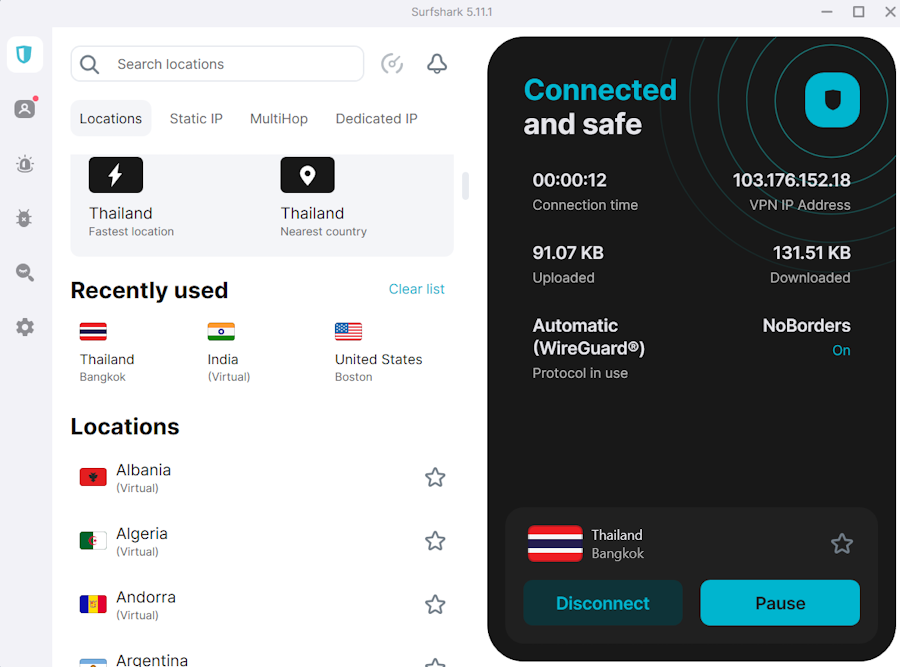
3. Avoid Using Personal Information
You should never trust websites and forums on the dark web with your personal information.
Suppose you share your name, social security number, or any other personally identifiable information on any dark website. In that case, there is a high chance that your data will become accessible to cybercriminals. Then, they can use your data to impersonate you and run social engineering attacks to target your loved ones.
What’s more, they can also sell you personal information on the dark web as your personal data has a monetary value on the dark web.
So, you should never share your personal information on the dark web. If you must make a payment, never use your credit card. Instead, use anonymous cryptocurrencies like Bitcoin.
However, we strongly advise against using dark web marketplaces due to legal risks and the high likelihood of being scammed.
4. Enable Strong Security Settings
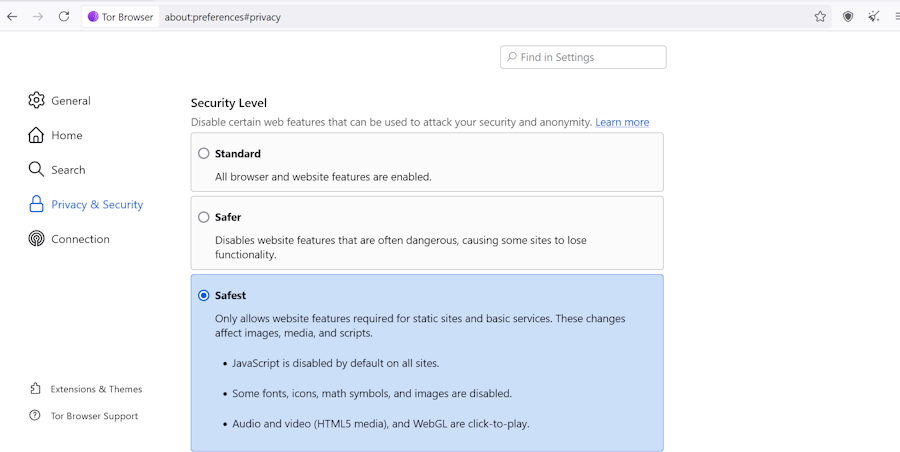
To access the dark web safely, you should enable strong security settings. Your Tor browser offers three security settings: Standard, Safer, and Safest. Before visiting the dark web, make sure you have selected the Safest option. To do so, go to Settings > Privacy and Security and select the Safest option in the security level section.
Also, you should ensure that the HTTPs-Only Mode in all Windows options is selected in the security settings to ensure a secure and encrypted connection between the Tor browser and the websites you visit.
You should review access to your camera, location, and microphone regularly to ensure no website has unnecessary permissions.
Additionally, check the Block pop-up windows and Warn when websites try to install add-ons settings.
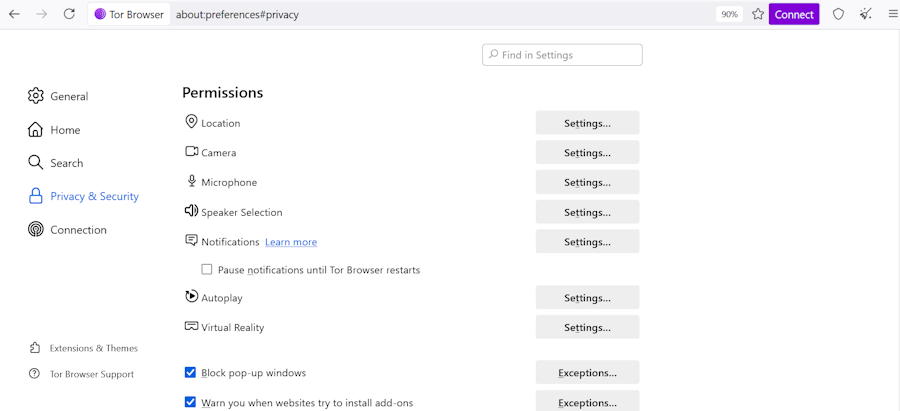
You can also consider installing Tor on a virtual machine to make isolation from your host computer.
5. Install and Update Security Software
Security solutions like anti-virus software protect your system and network from malware and other threats. The dark web, being a hub for criminal activities like identity theft and malware distribution, exposes you to various security threats like malware or phishing.
So, you must have the latest version of a good anti-virus program up and running before you venture into the dark side of the web.
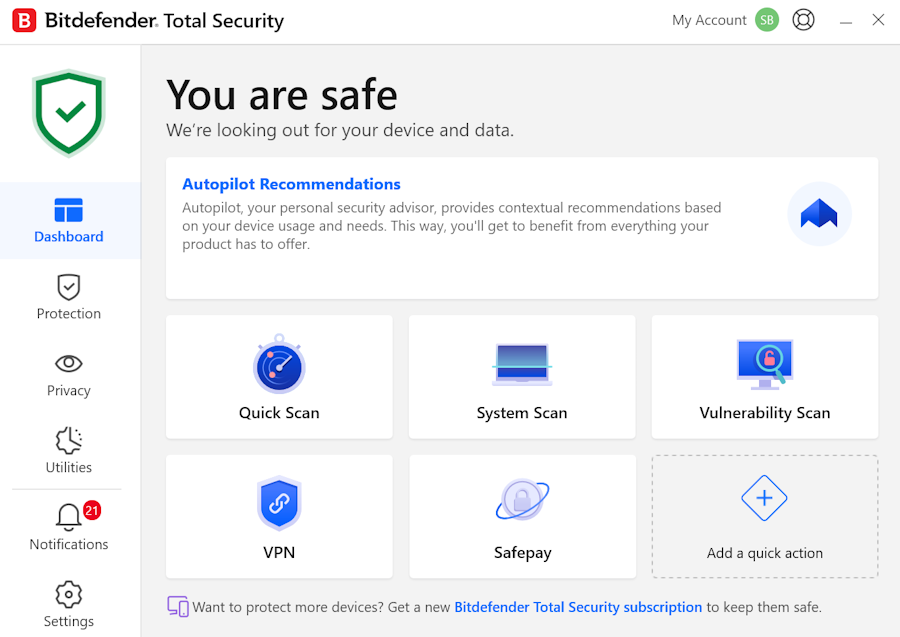
Threat actors also exploit vulnerabilities in your systems and software to gain access to them. So, you should also make sure that your system’s operating system and other installed software are patched with the latest updates.
6. Avoid Downloads from the Dark Web
Forums and websites on the dark web are not moderated, so you can never be sure they are free from malware. Therefore, you should avoid downloading files from the dark web, as seemingly innocent files may contain malicious software.
Cybercriminals often disguise malware within legitimate-looking files to trick users into compromising their own security. Once downloaded and opened, these files can install viruses, spyware, ransomware, or other harmful software without your knowledge.
Additionally, much of the materials on the dark web are illegal, and unknowingly downloading such content can implicate you in criminal activities punishable by laws. If your device is infected with malware, read our guide to remove malware from your computer.
7. Be Cautious of Links
The dark web is full of unknown and potentially dangerous content. Clicking on links there might take you to illegal or harmful material without warning.
For example, randomly clicking a link can land you in extreme content, such as child pornography, which is a serious criminal offense to access.
Therefore, you should stay cautious and avoid clicking when accessing the dark web. Doing so will protect you from accidentally accessing illicit content or becoming a victim of malware.
8. Stay Vigilant for Scams
Fake marketplaces and scams thrive on the dark web because there’s no one to turn to if you get scammed.
On the surface web, you can contact your credit card company or law enforcement for help. But the dark web operates like the Wild West—no rules, no protection. So, always stay extra cautious to avoid falling victim to scams.
9. Understand Legal Risks
Though it is not illegal to visit the dark web, accessing it can expose you to serious legal risks, even if you don’t have any criminal activity in mind.
A large portion of activities on the dark web involve illegal content, transactions, or services. Simply accessing certain sites or engaging with the wrong links could implicate you in criminal investigations.
What’s more, law enforcement agencies monitor dark web activities. Accidentally downloading or viewing illegal materials may result in severe legal consequences.
Therefore, you should understand the legal risks of accessing the dark web before you venture into this murky world.
Conclusion
Though not entirely shoddy, the dark web has a reputation for hosting illegal activities. It does support whistleblowers by offering them anonymity and secure communication in an oppressive regime. But navigating the dark web is full of cybersecurity and legal challenges.
We strongly advise against accessing the dark web, even for ethical purposes, unless you’re fully informed about the dark web risks and have enhanced your device’s security.
Reference
Click to Expand
Who’s Afraid of the Dark? Hype Versus Reality on the Dark Web
-
 EditorNarendra Mohan Mittal is a senior editor & writer at Geekflare. He is an experienced content manager with extensive experience in digital branding strategies.
EditorNarendra Mohan Mittal is a senior editor & writer at Geekflare. He is an experienced content manager with extensive experience in digital branding strategies.


